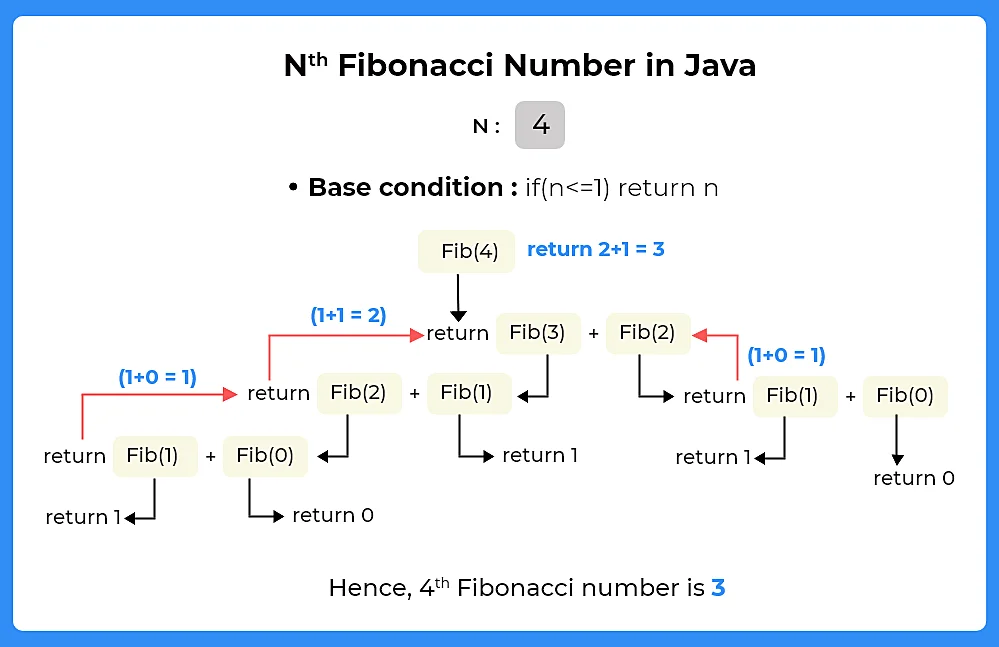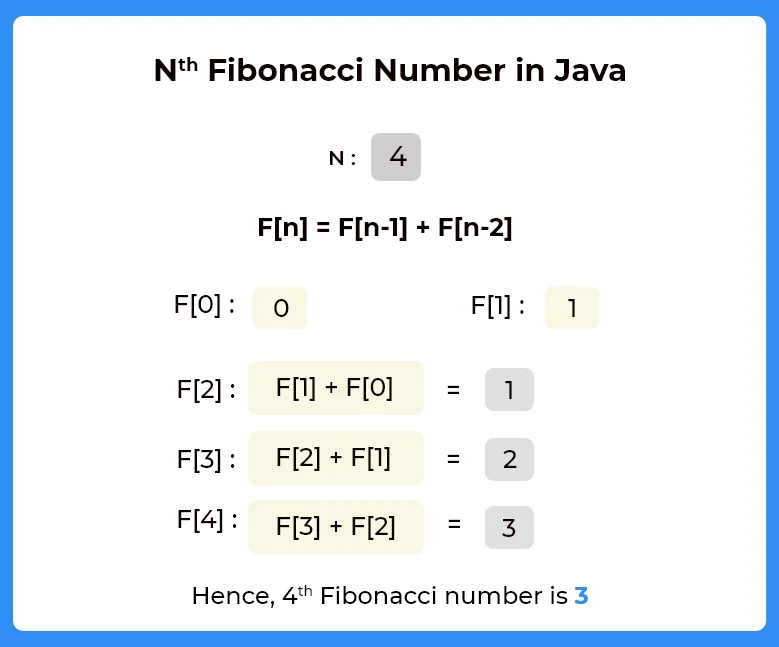0
Notifications Mark All Read
- Login
- Get Prime
Program to find N-th Fibonacci Number in Java
N-th Fibonacci Number in Java
Here, in this page we will discuss the program to find N-th Fibonacci Number in Java. he sequence F(n) of Fibonacci numbers is defined by the recurrence relation, F(n) = F(n-1) + F(n-2) where, F(0) = 0 and F(1) = 1.
In this page we will discuss the different methods to solve this problem in optimized way.

Method 1 (Using Recursion) :
- Create a function fib(int n),
- Inside that function define the base condition, which is if(n<=1) return n,
- Otherwise return fib(n-1)+fib(n-2).
Time and Space Complexity :
- Time-Complexity : O(n)
- Space-Complexity : O(1)

Code to find N-th Fibonacci Number in Java
Run
class Main {
static int fib(int n)
{
if (n <= 1) //Base Condition
return n;
return fib(n - 1) + fib(n - 2);
}
public static void main(String args[])
{
int n = 4;
System.out.println(fib(n));
}
}Output :
3
Method 2 (Using DP) :
- Create a function fib(int n),
- Inside that function, declare an array say f[] to store the fibonacci number.
- Set, f[0]=0
- If(n>0):
- Set, f[1] =1.
- Now, run a loop from i=2 to i<=n,
- Set, f[i]=f[i-1]+f[i-2]
- At last, return f[n].
Time and Space Complexity :
- Time-Complexity : O(n)
- Space-Complexity : O(n)

Code in Java
Run
class Main {
static int fib(int n)
{
int f[] = new int[n + 1];
int i;
f[0] = 0;
if (n > 0) {
f[1] = 1;
for (i = 2; i <= n; i++) {
f[i] = f[i - 1] + f[i - 2];
}
}
return f[n];
}
public static void main(String args[])
{
int n = 4;
System.out.println(fib(n));
}
}Output :
3
Method 3 (Using DP with optimized space) :
- Create a function fib(int n),
- Inside that function, declare three variables, a=0, b=1 and c.
- If(n==0), return a.
- Now run a loop from i=2 to i<=n,
- Set, c=a+b, a=b and b=c
- At last, return b.
Time and Space Complexity :
- Time-Complexity : O(n)
- Space-Complexity : O(1)
Code in Java
Run
class Main {
static int fib(int n)
{
int a = 0, b = 1, c;
if (n == 0)
return a;
for (int i = 2; i <= n; i++) {
c = a + b;
a = b;
b = c;
}
return b;
}
public static void main(String args[])
{
int n = 4;
System.out.println(fib(n));
}
}Output :
3

 0
0

Class fact{
public static int calf(int n){
If(n==1|| n==0){
return 1;
}
int n1= calf(n-1);
Int factorial= n*n1;
return factorial;
}
public static void main (String[]args){
Int n=5;
int ans= calf(n);
system.out.printl(calf);
}}
System.out.println(ans);
import java.util.Scanner;
class Fact{
public static void main(String args[]){
Scanner x = new Scanner(System.in);
System.out.println(“Enter a Number “);
int b= x.nextInt();
x.close();
int F= 1;
for(int i=1; i<=b;i++)
{
F= F*i;
}
System.out.println("Factorial of Number is " +F);
}
}
Kindly join our discord community for all your technical doubts.
Kindly join our discord community for all the technical doubts.